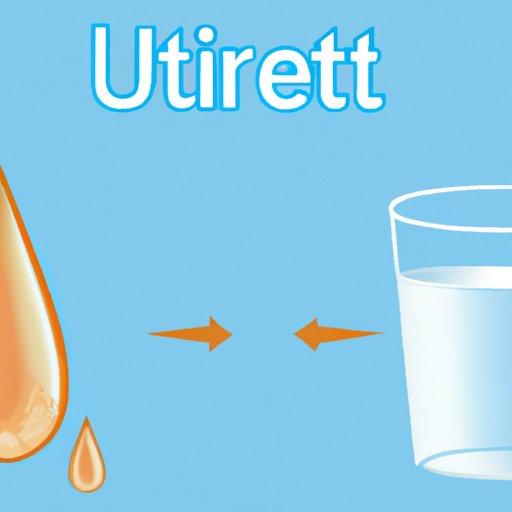
Introduction
UTIs can be incredibly uncomfortable and disruptive to daily life. Essentially, they are infections in the urinary tract, which can occur in any part of the system, including the bladder, urethra, or kidneys. Symptoms typically include pain or burning during urination, an urgent need to urinate, cloudy or dark urine, and pain in the lower abdomen or back.
For anyone who has ever experienced a UTI, it’s easy to understand why this is an essential issue to address. That’s why we’re focusing on the link between hydration and UTIs. Specifically, we’ll explore how dehydration can cause UTIs, tips for staying hydrated to prevent infections, and why water is your best defense against UTIs.
The Importance of Hydration: How Dehydration Can Cause UTIs
Dehydration occurs when the body doesn’t have enough water to function correctly, and it can have a range of negative health effects. One of the ways it can impact your body is by affecting the urinary system, specifically the bladder and urethra.
The urinary tract is responsible for collecting and eliminating urine from the body. When there isn’t enough water, it can be difficult for the system to function correctly. For example, without enough water, the bladder may not be able to empty completely, which can increase the risk of UTIs.
Additionally, dehydration can cause urine to become more concentrated and acidic, leading to inflammation and irritation of the urinary tract. Over time, this can increase the risk of developing an infection. In fact, even mild dehydration can increase the likelihood of developing a UTI.
Not Drinking Enough Water? Beware of UTIs
UTIs are a common problem for many people, but some individuals may be more susceptible than others. For example, people who do not drink enough water may be at higher risk for developing UTIs.
Some possible causes and risk factors of UTIs due to dehydration may include:
- Not drinking enough water throughout the day
- Drinking too much caffeine or alcohol, which can contribute to dehydration
- Being physically active or spending time in hot environments, which can cause you to lose more fluids and become dehydrated
- Having certain medical conditions that impact fluid balance, such as diabetes or kidney disease
Water is Your Best Defense Against UTIs
To prevent UTIs, it’s essential to stay hydrated. Drinking enough water throughout the day is a critical part of keeping your urinary tract healthy and reducing your risk of infection.
Here are some practical tips for staying hydrated and preventing UTIs:
- Drink at least eight glasses of water per day
- Cut back on caffeine and alcohol, which can be dehydrating
- Eat fruits and vegetables with high water content, such as watermelon, cucumbers, and celery
- Set reminders to drink water throughout the day
Remember, staying hydrated is an ongoing process. It’s essential to drink water regularly throughout the day, rather than trying to chug a whole bunch at once. By making hydration a priority, you can help prevent UTIs and keep your urinary tract healthy.
The Connection Between Water and UTIs
The link between dehydration and UTIs is clear, but what about the connection between staying hydrated and preventing recurring UTIs?
Research has shown that staying hydrated can be a highly effective way to reduce the risk of recurrent UTIs. A 2018 study published in the journal JAMA Internal Medicine found that women who increased their water intake experienced fewer UTIs than those who did not.
So, if you’re someone who has experienced recurrent UTIs, making hydration a priority could be an effective way to reduce your risk of future infections.
Are You at Risk for a UTI Due to Dehydration?
In conclusion, if you’re someone who has dealt with a UTI before or wants to prevent one from happening, staying hydrated is an essential step you can take. Dehydration can lead to UTIs by impacting the urinary system, making it more difficult for the body to flush out bacteria and waste effectively.
Thankfully, there are many ways to stay hydrated, including drinking water and other high-water-content fluids, eating hydrating fruits and vegetables, and avoiding dehydrating drinks like caffeine and alcohol.
By making hydration a priority in your daily routine, you can help keep your urinary tract healthy and reduce your risk of UTIs.





